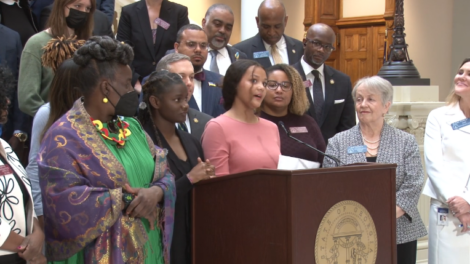• By Mikayla Arciaga, M.A.Ed. • IDRA Newsletter • May 2022 •
 The Georgia General Assembly concluded the second session of its biennial term in early April. As in state houses around the country, education was a focal point. Governor Brian Kemp had identified his key action items for this year’s session, including fully funding the state’s education formula, censoring classrooms and banning trans children from school athletics. The following is an overview of IDRA’s work with policymakers and advocates and the results from this legislative session.
The Georgia General Assembly concluded the second session of its biennial term in early April. As in state houses around the country, education was a focal point. Governor Brian Kemp had identified his key action items for this year’s session, including fully funding the state’s education formula, censoring classrooms and banning trans children from school athletics. The following is an overview of IDRA’s work with policymakers and advocates and the results from this legislative session.
Stakeholder Voices Coalesce for Strong Education
Students, educators and advocates expanded the conversation around what constitutes a broad, diverse curriculum. This session saw tremendous engagement and participation among young people in every capacity (Downey, 2022). IDRA supported students who traveled to Atlanta to testify and speak at news conferences, many for their first time (see IDRA’s video gallery of student testimony).
IDRA formed the Georgia Coalition Against Classroom Censorship that provided a space for learning and planning for students, educators and other advocates. It will continue to inform future work and collaboration. IDRA also launched the Southern Education Equity Network website for news and advocacy collaboration.
Fair and Full Funding of Public Schools Undermined
Georgia leaders took some positive steps toward funding public schools. First, it approved a 2021 amended budget that filled in proposed budget deficits and a 2022 budget that allocates the entire amount of funds required by Georgia’s Quality Basic Education (QBE) formula. This is a weighted formula that dictates the funds allocated to each of the state’s 180 school districts.
Unfortunately, the Georgia legislature has not revised the formula since its passage in 1985 (Owens, 2022), raising concerns that the state is not meeting the actual needs of its public school students. For example, unlike funding for serving emergent bilingual students, the state formula does not include a weight specifically targeted toward serving students living in poverty. According to the Education Commission of the States, Georgia is one of only six states that does not provide necessary additional funding for educating students in families with limited incomes (2021).
Policymakers attempted to address this through two bills. House Bill 10 would have added a weight to the QBE using free and reduced-price lunch program percentages to allocate additional funding to schools, but it was not passed out of committee. Senate Resolution 650 was passed to create a study committee to review the QBE formula in its entirety.

Georgia students hold news conference to present their statements after testimony was abruptly cut off at the beginning of a hearing.
Legislators took a positive step by refusing to pass several bills (HB 60, HB 999, Senate Bill 601) that would have established new vouchers that divert public money to private schools up to $6,000 per entering child (see IDRA testimony against HB 999 and SB 601).
But the Republican-dominated legislature pushed through HB 517 to increase the cap for the Georgia Special Needs Scholarship voucher from $100 million to $120 million despite bipartisan opposition detailing the lack of oversight and accountability for this program.
Legislation Creates Hostile Environment for Vulnerable Student Populations
Like in many other southern states, Georgia legislators proposed several bills to censor classrooms and library materials (e.g., SB 226) under the guise of creating increased parent access and transparency. Legislators passed a so-called “parents’ bill of rights” (HB 1178) and a “divisive concepts” bill (HB 1084) that allow individual parents to restrict curricular materials allowed in classrooms. Students, parents, educators and public school advocates opposed these bills out of a concern that they make it harder for teachers and administrators to protect students’ access to diverse, culturally sustaining learning materials (see IDRA testimony against SB 226 and HB 1084).
Legislators furthered their efforts to slight marginalized groups by amending the “divisive concepts” bill to include language that would punish schools for allowing transgender athletes to participate on the team that reflects their gender identity. Troublingly, legislators performed this move in the last minutes of the session and did not allow time for others to read or discuss this harmful provision (Luneau, 2022).
The issues of funding and censorship demanded lawmakers’ significant attention throughout the session, leading them to neglect many important issues for students. Policy that would have prohibited corporal punishment statewide never received a hearing. A bill that would have expanded social studies curriculum to broaden the historical contributions of Black Americans did not proceed past a hearing. This was also the case for policies that would serve emergent bilingual populations. Very few bills were filed, let alone passed, that would have served the diverse population of Georgia or increased language access.
Even in this environment, IDRA set the stage to end the use of deficit terminology for emergent bilingual students. In collaboration with our partners, we will continue to advocate this, along with culturally sustaining schools and equal opportunity for every student.
Resources
Downey, M. (April 1, 2022). GOP Lawmakers Ignore Student Concerns Over Education Bills. Atlanta Journal Constitution.
ECS. (2021 October). K12 and Special Education Funding: Funding for Students from Low Income Backgrounds. Education Commission of the States.
Luneau, D. (April 5, 2022). In Dead of Night, Georgia Lawmakers Sneak Through Legislation Allowing Discrimination Against Transgender Kids Playing School Sports. Human Rights Campaign.
Owens, S. (2022). State of Education Funding, 2022. Georgia Budget & Policy Institute.
Mikayla Arciaga, M.A.Ed., is an IDRA Education Policy Fellow. Comments and questions may be directed to her via e-mail at mikayla.arciaga@idra.org.
[©2022, IDRA. This article originally appeared in the May 2022 IDRA Newsletter by the Intercultural Development Research Association. Permission to reproduce this article is granted provided the article is reprinted in its entirety and proper credit is given to IDRA and the author.]


